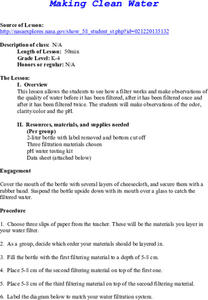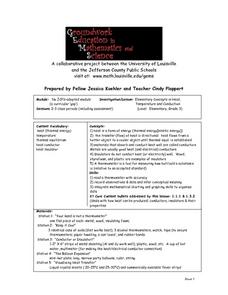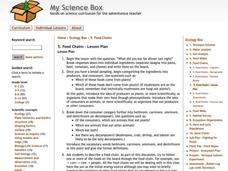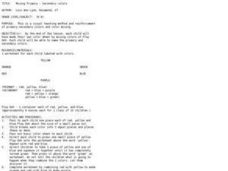Curated OER
Magic Color
First graders discover that a chemical reaction is responsible for the effects seen with Crayola Color Wonder markers. They observe that the color changes are the result of a chemical reaction between chemicals in the Color Wonder paper...
Curated OER
Shrinky Dinks® Palettes
Here is a fun and clever lesson for teaching physics classes how to calculate wavelength if given the energy and frequency data. On a worksheet, they compute wavelengths using a table of information that you provide. On a paper palette,...
Curated OER
How Do The Colors of Light Mix?
Students investigate the mixing of light. They form a hypotheses to reason why color changes occur and they write conclusions and ask new questions arising from the investigation. Students identify the primary and complementary colors of...
Curated OER
The Candy Color Caper
Young scholars explore the concept of probability. They calculate the probability of an event happening and graph their results. Students determine the probability of winning a sweepstakes. They construct a bar graph to represent all the...
Curated OER
Colores del mundo
Students are introduced to the names of colors in Spanish. After being shown artifacts, they identify and write the color of each object. They also create a coloring sheet in which they trade with their classmates when needed.
Novelinks
The Westing Game: Anticipation Guide
Are all criminals bad people? Pupils answer this and other compelling questions in an anticipation guide for The Westing Game by Ellen Raskin. Designed for learners to complete before reading the text, the...
Curated OER
Identifying Minerals
Students compare and constrast a wide variety of minerals and rocks. They test them for streak, luster, color and other characteristics. They view an exhibit and compare their answers to them.
Curated OER
Fall Slumbers
Students observe changes in a selected tree leaf near their homes during the fall. Twice each week students record changes in the leaf using words, pictures, and numbers.
Denver Art Museum
Putting Images into Words
Engage your class in art analysis of Indian Look-Alike by Melanie Yazzie. Using this work of art as inspiration, writers compose a poem or short story. After a peer review session, the teacher conveys information about the work of art as...
Curated OER
Making Clean Water
Students examine water samples assess the quality of each sample by examining the color/clarity, smell, pH, etc. of each Then they filter the water samples once and assess water quality a second time. finally they filter the samples a...
Curated OER
Elementary Concepts in Heat
Third graders read a thermometer with accuracy, record observations and data, and infer conceptual meaning. They integrate mathematical charting and graphing skills to organize their data. They explore what happens when they touch or use...
Curated OER
Food Chains
Students describe food cahins and the role of organisms. Using a set of organism cards, they color code the organisms on their cards by their role in the food chain. Once a complete chain is identified, they glue it on a sheet of paper.
Curated OER
Algebra...Your Second Language
Help learners translate word problems into algebraic equations. They will rewrite words using symbols and evaluate algebraic expressions using real life scenarios, animation sequences, video presentations, and activities to help students...
Curated OER
Mixing Primary and Secondary Colors
Students create their own color wheel by mixing colors of Playdoh. Each child names the primary and secondary colors.
Society of Petroleum Engineers
Renewable and Nonrenewable Energy
Energize an environmental science unit on natural resources with this collection of instructional materials. From simple coloring sheets for primary grade children, to guiding questions for a high school research...
Curated OER
Using Your Senses
Students use their senses to make observations. In this senses lesson plan, students investigate unknown substances by using their senses for observations. Students identify the number of the substances used, the color, the odor, the...
PBS
Frame Yourself: Area and Perimeter
Elementary schoolers are arranged in pairs and view the video Math Works: Measurement: The Difference Between Perimeter and Area. They discuss any prior knowledge they have of the term perimeter and then brainstorm together what the...
South Gloucestershire Council
Animal Classification: A Collaborative Sorting Activity for Key Stages 2 & 3
Introduce the logic behind a dichotomous key or administer a group performance assessment with a fun and challenging classification lesson. With explicit instructions for the teacher and for collaborative groups, as well as engaging...
Curated OER
Techno Book
First graders explore language arts by utilizing educational software. In this storytelling lesson plan, 1st graders utilize Microsoft Word to create their own children's story incorporating images as well. Students proofread their...
Desert Discoveries
Creating a Garden Journal
Youngsters create science journals which are used to record observations from the school garden. The goal of this activity is to help kids tune into nature by making daily observations on the growth of the plants, and also to take note...
Curated OER
Rainbows
Second graders investigate how a rainbow is made. They listen to the book "What Makes a Rainbow," and discuss how a rainbow is created. Students then conduct an experiment involving pouring a cup of milk into a bowl and adding drops of...
Curated OER
"The Soil Around Us" Project
Students look at Web sites containing information about soil and related subjects such as earthworms. They use Web site review sheets to focus their review of the content on the sites and to introduce evaluation concepts for the design...
Curated OER
Catch a Rainbow
Second graders listen to a book read to them entitled, WHAT MAKES A RAINBOW and recall and describe their five senses and what parts of their bodies use their five senses and then complete the Catch a Rainbow activity sheet using a...
Curated OER
Bat Fact Page
Third graders investigate unusual bats and draw their own interpretation of the bat. They use rhyming words to write a creative story about bats. Facial features of microbats and megabats are observed and then classfied in groups.























